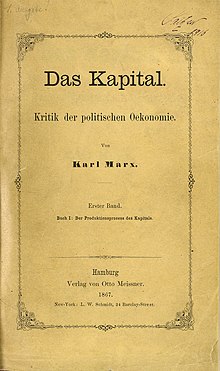Das Capital

First edition title page of Volume I (1867)
Volume II and Volume III were published in 1885 and 1894, respectively |
|
| Author | Karl Marx |
|---|---|
| Original title | Das Kapital. Kritik der politischen Oekonomie |
| Country | Hamburg |
| Language | German |
| Published | 1867 |
| Publisher | Verlag von Otto Meisner |
Capital. Critique of Political Economy (German: Das Kapital. Kritik der politischen Ökonomie, pronounced [das kapiˈtaːl, kʁiːtɪk deːɐ pɔliːtɪʃən øːkoːnoːmiː]; 1867–1883) by Karl Marx is a foundational theoretical text in materialist philosophy, economics and politics. Marx aimed to reveal the economic patterns underpinning the capitalist mode of production, in contrast to classical political economists such as Adam Smith, Jean-Baptiste Say, David Ricardo and John Stuart Mill. Marx did not live to publish the planned second and third parts, but they were both completed from his notes and published after his death by his colleague Friedrich Engels.
In Capital. Critique of Political Economy (1867), Marx proposes that the motivating force of capitalism is in the exploitation of labour, whose unpaid work is the ultimate source of surplus value. The owner of the means of production is able to claim the right to this surplus value because he or she is legally protected by the ruling regime through property rights. The historical section shows how these rights were acquired in the first place chiefly through plunder and conquest and the activity of the merchant and "middle-man". In producing capital (produced goods), the workers continually reproduce the economic conditions by which they labour. Capital proposes an explanation of the "laws of motion" of the capitalist economic system, from its origins to its future, by describing the dynamics of the accumulation of capital, the growth of wage labour, the transformation of the workplace, the concentration of capital, commercial competition, the banking system, the decline of the profit rate, land-rents, et cetera.
...
Wikipedia
